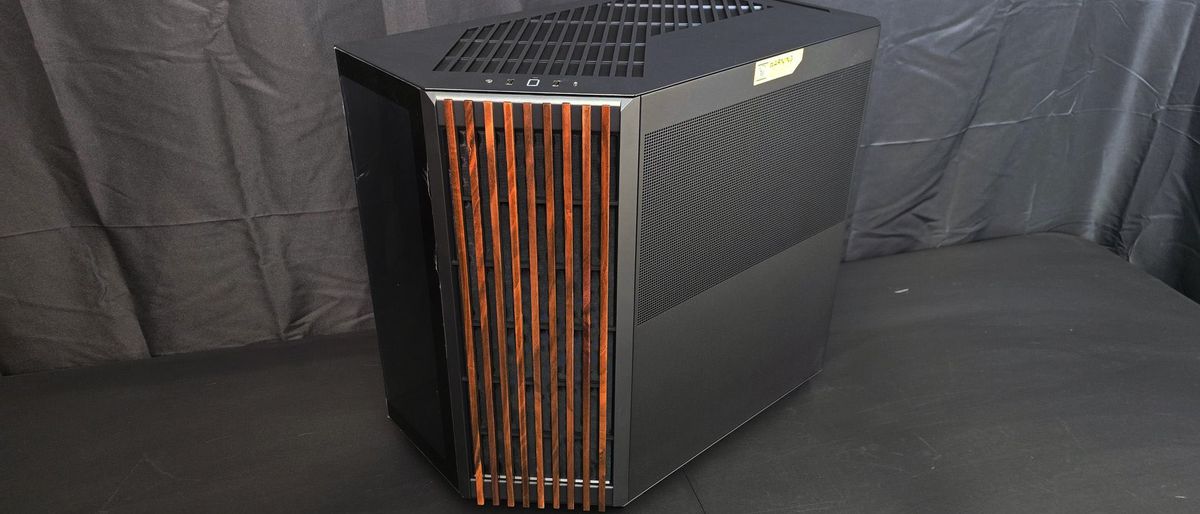Tom's Hardware Verdict
APNX V1 is a high-quality case with good thermals, smart engineering, and a reasonable price.
Pros
- +
Strong thermal performance
- +
Cheaper than competitors
- +
Wood panel option available
- +
Better engineering than most fishbowl-style cases
Cons
- -
Taking apart the case takes a few extra steps
Why you can trust Tom's Hardware
The latest PC case on our test bench is APNX V1, a big fishbowl-style case that sets itself apart from the competition with an angled intake design. As you’ll see in our benchmarks below, this gives it an advantage over competing cases. The cherry on top is the price: At only $119, it’s cheaper than many bigger-name competitors.
Will the APNX V1 make our list of best PC cases? Let’s take a look at the specifications of the case, straight from APNX, then we’ll go over the features of this case and wrap up our review with thermal benchmarks.
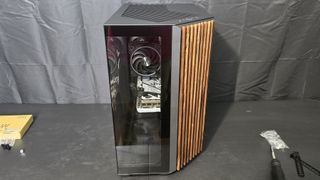
Product Specifications
| Motherboard Support | ATX, Micro ATX, Mini-ITX |
| Color | Black, White, and Wood Panel options |
| Type | Fishbowl |
| Case Dimensions | 500mm (L) x 485.5mm (H) x 290mm (W) (19.7 x 19.1 x 11.4 inches) |
| 2.5-inch Drive Support | Up to six drives |
| 3.5-inch Drive Support | Up to two drives |
| PCI-E Expansion Slots | 7 |
| Fan Support | Up to 10 fans |
| Pre-Installed fans | None |
| CPU Cooler Clearance | 170mm (6.6 inches) |
| GPU Clearance | 395mm (15.5 inches) |
| PSU Length | 220mm (8.66 inches) ATX |
| Radiator Support | Up to three 360mm radiators on the top, side, and bottom supported. |
| MSRP | $119.99 – Standard Version $139.99 – Wood panel version |
Features of APNX V1 Computer Case
Six style options
Since the release of Fractal Design’s North tower, wood panels have enjoyed a resurgence among PC enthusiasts. APNX’s V1 typically comes in black or white options, but if you’re willing to spend $20 more, a wood panel option is available as well.
Also note that, while the black model we were sent for review looks gray in many of our photos due to the brightness of our photography lights, under normal lighting it's as typical black cases you might see from any other case brand.
There are a total of six styles available: Black, White, Mixed, and those same options with wood panels.
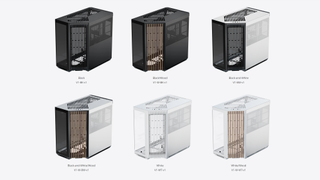
Included GPU holder
APNX incorporates a built-in GPU holder to combat video card sag.
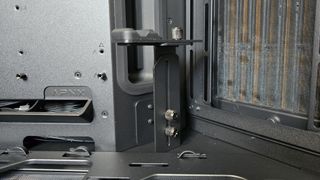
Side view, better airflow design, adjustable motherboard height
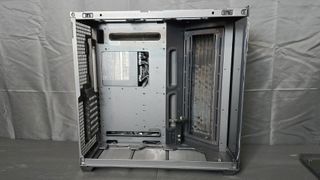
The first thing that sticks out to me is how APNX’s fishbowl design is different from most competitors. The airflow of most fishbowl-style cases have intake fans that push air from one side of the case, directly into the glass panel on the opposite side. I don’t like this type of design, because the strength of airflow gets reduced when it smacks into the side panel.
APNX avoids this issue by implementing its intake fans on a 45-degree angle, which allows the V1 to have better thermal performance than the competition – as you’ll see in the benchmarks down below.
If you look closely in the photo above, you’ll see that there are two rows of slots for motherboard installation. That’s because the case supports motherboard installation both lowered and raised, according to your needs. Next to the area for the intake fans, you have cable management paths and the built-in GPU holder.
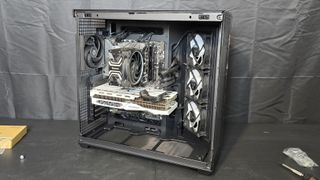
Radiator and fan support
This case can be equipped with up to 10 fans. There’s support for one exhaust fan and up to nine fans from the top, side, or bottom of the unit. You’re also able to install up to three 360mm radiators from the top, side, and bottom.
Dust filters
There are dust filters built into the top, side, and top of the unit as well. The dust filter at the bottom is very easily removable, but to reach the other two filters, you’ll need to remove the front wood panel or the top panel – nothing too difficult.
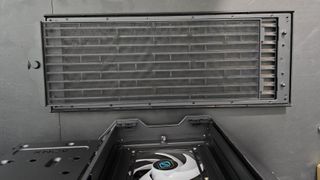
Front view
Like other fishbowl designs, most of the front of the case is see-through glass – the most striking difference is the angled intake and the wood front panel.
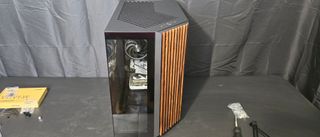
IO Panel
The IO Panel is located above the angled front panel and includes one USB-C, two USB-A, an audio jack, and power and reset buttons.
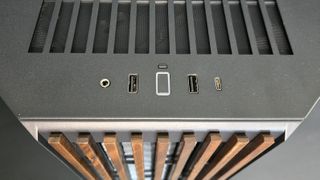
Rear side view, hardware ARGB and PWM fan hub, storage, and cable management features
The APNX V1 has cable routing paths and velcro straps to facilitate cable management. Also included to assist with cable management are a small number of cable ties.
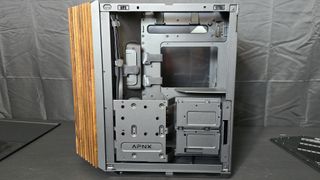
Cables can also be hidden behind the bottom storage drive plate, which supports up to six 2.5-inch drives, two 3.5-inch drives, or 1x 3.5-inch drive and four 2.5-inch drives.
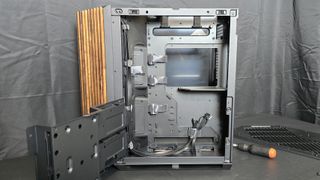
Rear view
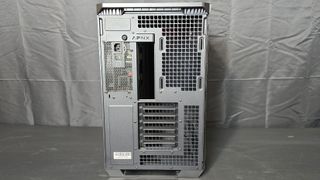
There’s not much to say about the case’s backside. The one thing that is a little different from the competition is the inclusion of a “smart bar,” the part that is directly above the power supply and IO panel slot. If you choose to install a motherboard with a raised setup, it can be moved to the bottom to cover the gap that would otherwise be visible.
One tiny complaint
The only thing that I didn’t like about this case is that the side panels are screwed in, requiring extra steps to take it apart – but this is a minor complaint in the grand scheme of things. APNX states that these screws are only included to ensure the safety of the product during shipping, and that the official company stance is that the screws are unnecessary after the product has been delivered.
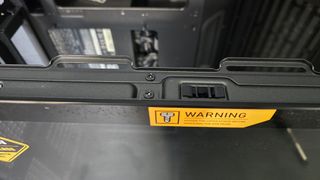
Thermal Tests, Test Setup, and testing methodology
| CPU | Intel i9-14900K | Row 0 - Cell 2 |
| CPU Cooler | Akasa Soho H4 Plus | Row 1 - Cell 2 |
| Motherboard | ASUS Z790-P Prime Wifi | Row 2 - Cell 2 |
| GPU | ASRock Steel Legend Radeon RX 7900 GRE | Row 3 - Cell 2 |
These thermal tests are presented to give you more information about the product’s performance, but aren’t intended as the sole judgment of the chassis. The style, price, features, and noise levels of a case should also be considered – and we all have different preferences. What I might like in a case, you might not – and that’s OK. My goal with these reviews is to give everyone, no matter their preferences, enough information to decide whether or not a product is right for them.
Today’s case lacks pre-installed fans, so I’ve set up the cases shown in the benchmarks below with the same set of standardized fans. The ways I’ve tested the cases are as follows:
- A “worst case scenario” stress test with a full load on the CPU and the GPU.
- A “heavy gaming scenario” stress test with a full load on the GPU and partial load on the CPU
- A CPU-only stress test, measuring the CPU’s thermals and VRM thermals
MORE: Best PC Cases
MORE: Best Mini-ITX Cases

Albert Thomas is a contributor for Tom’s Hardware, primarily covering CPU cooling reviews.
-
YSCCC As well as it's look and functionality is doing, I personally have a reluctance to appreciate such an NZXT H6 (which is a mostly clone and slightly mirrored Hyte Y60) clone fusion with the fractal north panel.... personally I appreciate the innovator more (so as to I purchased a Fractal North back in the dayReply -
-Fran- Beauty is always in the eye of the beholder, but that thing is ugly to me xDReply
I like my lil' Bitfenix all-metal small case (regular ATX), so I'll keep it for a long while.
Thanks a lot for the review and nice data as always, Albert.
Regards. -
UnforcedERROR Reply
The issue with the wood accent trend that the North started is that most companies don't understand why people liked them. The North felt like it'd go with mid-century furniture. It's a very classy looking case, but the wood isn't the entire reason it looks nice. This case just has a wood front, but it's a standard appearance otherwise and that's ultimately the entire problem. If there's one thing Fractal has gotten right it's paying attention to the design as a whole, not just the functionality.YSCCC said:As well as it's look and functionality is doing, I personally have a reluctance to appreciate such an NZXT H6 (which is a mostly clone and slightly mirrored Hyte Y60) clone fusion with the fractal north panel.... personally I appreciate the innovator more (so as to I purchased a Fractal North back in the day -
YSCCC Reply
Yea, surely that the north have that nailed much better, but even if this actually turned out nailing the design also I would hate these sort of "copy your high grade classmates and combine to hope for a higher grade with minimal effort" type of designs...UnforcedERROR said:The issue with the wood accent trend that the North started is that most companies don't understand why people liked them. The North felt like it'd go with mid-century furniture. It's a very classy looking case, but the wood isn't the entire reason it looks nice. This case just has a wood front, but it's a standard appearance otherwise and that's ultimately the entire problem. If there's one thing Fractal has gotten right it's paying attention to the design as a whole, not just the functionality. -
bit_user IMO, the "right" way to implement an internal radiator is to segregate its airflow from the rest of the case. This resolves the age old debate of whether to put the radiator at the intake or exhaust.Reply -
husker By orienting the intake fans at an angle, it does indeed improve the thermals. The problem is that the attractive angled side with the wood is now facing away from the large glass panel on the side where the user is most likely to be seated. In other words, the user can orient the computer to view either the glass side or the wood side, but not both at the same time. This is a compromise made in the interest of thermals, fair enough. But it is thermals done right, not aesthetics done right if you want to enjoy the beauty of your build properly. For comparison, this is why the Hyte Y70 has the gorgeous display panel adjacent to the glass side, not opposite it.Reply
Edit: Also, the power and ports at the top is another design error (IMO). A location toward the bottom of the case would be easier to access and to run, say, a USB cable to a mouse or to charge your phone. -
HankSc0rpi0 What about the fact when you remove the panels, the case is extremely flexible like the hyte cases. Rubbish build quality . Th Antec c8 has no issues with being flexy.Reply -
Albert.Thomas Reply
Everyone has their own preferences. If you don't like the wood aesthetic, there are other options available.BTM18 said:Damn that is ugly. Hard pass. -
MergleBergle Reply
I agree. I think the Fractal North is ugly too, the wood is too overdone for my taste. Reminds me of a 1970s station wagon with the "wood" paneling on the outside. Prefer the Antec Flux way of using it as an accent instead of a feature. And as you said, there are other models that don't feature the wood thing.Albert.Thomas said:Everyone has their own preferences. If you don't like the wood aesthetic, there are other options available.
As for this case, I think it's a clever design that makes me wonder why none of the "big boys" thought of it first. I'm not a fishtank fan, but if you're going to do it, these guys may have found the right way to get the components cooled while retaining that whole.. fishtank thing. :cool:
